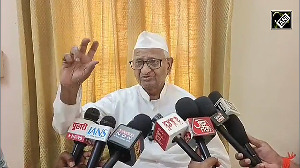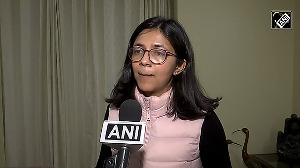The Pakistan government has abruptly backtracked on a decision to place the powerful Inter-Services Intelligence agency under the control of the interior ministry apparently due to pressure from the army and President Pervez Musharraf.
The government's U-turn came less than 24 hours after an official notification issued on Saturday said the ISI and the Intelligence Bureau were both being placed under the control of the interior ministry.
The change also highlighted the delicate balance of power between the new civilian government and the influential army.
Saturday's notification, which an official press release said was approved by Prime Minister Yousuf Raza Gilani, said the ISI and IB were being placed "under the administrative, financial and operational control" of the interior ministry with "immediate effect".
Gilani left Pakistan for an official visit to the US the same day. As pressure from the army mounted on the government on Sunday, an official spokesman virtually reversed the notification, saying, "ISI will continue to perform its functions under the prime minister."
The notification regarding control of the ISI was being "misinterpreted", he said. The spokesman further said that the "notification only re-emphasises more coordination between the ministry of interior and ISI in relation to the war on terror and internal security."
He added that details would "be clarified in a comprehensive notification". There was confusion about the status of the IB as the spokesman was silent on who would control the organisation.
The ISI is technically supposed to be under the control of the prime minister, but has traditionally functioned as a part of the influential army.
The ISI chief, an officer of the rank of lieutenant general, and most of its officer cadre are drawn from the army. The current chief, Lt Gen Nadeem Taj, was appointed by Musharraf and is a relative of the president.
Reports have suggested that the notification placing the ISI under the control of the interior ministry was issued
at the behest of Rehman Malik, a senior leader of the ruling Pakistan People's Party and close confidant of party chief
Asif Ali Zardari. Malik, who is not an elected representative, functions as the interior minister.
Malik told TV channels that the president, Army Chief Gen Ashfaq Parvez Kayani, Prime Minister Gilani and Zardari
were consulted and had agreed to the change. But the presidency and the army headquarters have said categorically
that they were not taken on board.
The move to place the ISI under the interior ministry's control caused "extreme tension between various sections of the government and establishment" and the government made a u-turn due to "intense back-channel efforts," the Dawn newspaper reported on Monday.
The reversal was the result of "immense pressure from defence circles" on the civilian set-up, sources said.
Military spokesman Maj Gen Athar Abbas said the army chief and other defence authorities had not been taken into confidence on the issue.
"Although there is an ongoing debate that there should be close coordination between all intelligence agencies, placing the ISI under the direct control of the interior division was never discussed," Abbas said.
Pakistan military spokesman Abbas said the ISI is a huge organisation and the interior ministry could not have handled its financial, administrative and operational affairs.
"When we realised that the decision had been taken, we discussed the issue with the government and are thankful that there was a realisation of ground realities and our position was accepted," he said.
In the recent past too, Malik embarrassed the government by getting by-elections scheduled for June postponed. The decision had to be reversed after protests from the Pakistan People's Party's coalition partners.
Zardari, who is currently in Dubai, initially hailed the decision to place the spy agency under the interior ministry, saying civilian authorities would now be "able to respond to allegations against the ISI."
Zardari also said no one would be able to say that the agency "is not under the elected government's control".
After the government reversed its decision, Zardari told The News daily that there was no "bad intention" behind the move.
He said, "We don't want any confrontation between different state organs and that was why the prime minister tried to remove some misunderstandings through a clarification released by the Press Information Department."
Zardari acknowledged that some more homework and detailed consultations were needed before such a sensitive decision was announced. "It's a new government with a lot of challenges and problems. Anybody can make mistakes in such a situation, but nobody should doubt our intentions."
Information Minister Sherry Rehman too sought to defend the government's actions. "The ISI is already under civilian control. It is overseen by the establishment and cabinet divisions which work under the prime minister," she told a TV channel.
Two former ISI chiefs, retired generals Hamid Gul and Asad Durrani, said the Pakistan government's reversal showed that the authorities concerned had not been taken into confidence.
The opposition Pakistan Muslim League-Q too criticised the government's actions, saying it had tried to "convert the ISI into a partisan political instrument."
PML-Q secretary general Mushahid Hussain Sayed described the episode as another example of the "PPP's incompetence and ill-intentioned moves."
He said the government's retraction clearly indicated "how serious the tussle for power between the prime minister and extra-parliamentary forces" had become.






 © 2025
© 2025